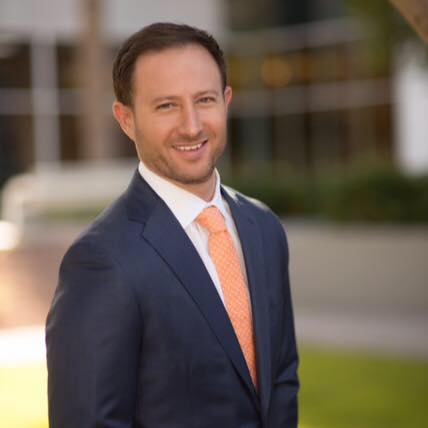
Jon Tobias, senior vice president, area manager at Fairway Independent Mortgage Corp., is responsible for putting more Americans into homes than almost every other mortgage loan officer in the U.S.
Tobias has been a top 1% mortgage originator since 2013, before he became a branch manager at Fairway and shifted his focus to enabling his team, and is passionate about his work, his team and paving the way for others to follow.
Once a top originator, Tobias is now focused on leading his team. He explained that his new role deals a lot more with people than it does originations. He brings his experience as a top originator to his role today as he empowers his team to make decisions and excel in any market.

Today, Tobias is a long way from where he started, or even thought he would start as he graduated college.
“Ever since I was a little boy, I wanted to be a loan officer,” Tobias said.
It was a joke.
“People just kind of fall into our industry, it’s not one of those things that you can get a college degree for,” he said.
Tobias graduated in 2002 from the University of Arizona with a degree in regional development, the closest he could get to commercial real estate – the family business.
“I didn’t know what I wanted to do but that’s what my dad had done and that’s what I’d been exposed to as a kid, commercial development, so I just figured I would go into that because I didn’t really have a specialty that I wanted to get into.”
But when Tobias accepted his first job just six months after he graduated, all of that changed.
Taking the first salary offer that would move him out of his parents’ house, Tobias suddenly found himself in mortgage originations. It wasn’t part of his plan, but he fell in love with it.
From his Monday video updates to his Saturday email blasts sent out to partners, Tobias stays connected to his teams and to the industry through a variety of methods. His team sends out emails every Saturday with market updates, price changes and more to stay in front of their partners.
“We try to have as much face time as possible and ultimately they work with us because of our high-level communication follow through,” he said.
Tobias was a top 1% mortgage originator and held the top spot for most loans closed in Maricopa County, which encompasses the Phoenix area, from 2013 to 2017, according to the Scotsman Guide.
Arriving at that top spot took work, and Tobias began his career as an assistant processor in October 2002 before becoming a processor, which he did for two years. But his thirst to learn more was clear. He took a job at Meritage Homes, where he began working in the homebuilder space in their mortgage arm.
In January 2008, in the midst of the Great Recession that brought many housing professionals to their knees, Tobias struck out on his own. He grew his volume and after a time, his team became so overwhelmed that they couldn’t return phone calls fast enough.
Like most of the U.S. before the Great Recession brought the housing market down in 2008, Phoenix, Arizona, was thriving. Jobs were up, incomes showed strong growth, confidence was high and mortgage borrowing was soaring.
But then, the Great Recession hit. Incomes fell for the first time in 40 years. Home prices plummeted. Unemployment rose. And one in seven mortgages were at least 90 days late.
The crash was felt across the U.S., but Arizona was hit especially hard as metro areas in the Grand Canyon state had been growing at breakneck speed. Phoenix was one of the cities most impacted by the financial crisis — some even called it the epicenter of the housing crisis.
Even several years after the crisis hit, two-thirds of Phoenix mortgage holders were underwater — owing more on their home than it was worth. Median home prices dropped more than 50% — a drop experienced by no other city the size of Phoenix, which has more than 4 million residents.
Phoenix residents compared it to the Great Depression. The once-thriving economy was lost. The heartbeat of the city was dropped to a mere flutter.
And it was from this recession that Tobias emerged when he set out on his own in 2008. Forged in the fire, his team rose to become one of the top lenders in the Phoenix marketplace for the next 10 years.
Tobias and his team embodied the fighting spirit in Arizona as they fought their way to the top, even in one of the most challenging economies the city had ever seen. After setting off on his own and growing his team, Tobias’ career once again took a turn.
About five years ago, Tobias joined Fairway Independent Mortgage Corp.
“I really wanted to grow, I wanted to run a branch, wanted to manage a P&L, I wanted to recruit, and I felt like this was the best place for me to be able to do that. And it’s worked out wonderfully so far.”
Jon Tobias
Tobias now leads 18 team members on The Tobias Team and heads a branch of about 120 team members. His personal team originated nearly $20 million per month in 2019, or about $237 million for the year.
What does it take to grow that kind of team?
“It’s a heck of a lot of teamwork, a very high level of communication, and everybody knowing their roles and working together in concert to make sure the process is smooth,” Tobias said.
The team draws in about 75% of its business from real estate agents, 15% from builders and about 10% from past clients, he explained.
The role Tobias plays in origination today looks vastly different than it did even just a few years ago. Today, Tobias is an area manager for Fairway, and plays a much smaller hands-on role in origination.
Now that he is an area manager, each day looks different. As a loan officer, he could structure his day, but now, his Outlook calendar moves him from one meeting to the next.
“My No. 1 goal is to make sure I’m responding to people as fast as possible and solving their needs and providing solutions,” Tobias said. “That’s what I do all day; it’s being in the people business, helping people all day long with issues or helping them be better in some way.”
Now, as he sets agendas for his team, he said that seeing how he is helping change the lives of those around him is one of the bright spots in his day.
He feels this impact, for example, when he goes to a holiday party, and someone tells him how much he has impacted their spouse’s life at work. Or when they talk about how much their spouse loves working for the company and the culture it has built. The culture, tools, team building and coaching Tobias provides his team pushes them to the next level.
“It’s fun to watch people grow and take the next steps in their careers,” he said. “We like to make it the best place for a loan officer to come work and grow their business.”
Tobias is drawing on his experience as a loan officer himself to drive his decisions as a manager today. His time as an originator helps him know what to provide his team in terms of marketing and other tools to help them focus as they grow their business.
Now, Tobias’ days consist of many conference calls, and talking with different branch managers and mentoring them on their financials or helping them with recruiting by calling or following up with recruits.
His life away from the office can be just as crazy as his days inside. Having a baby is enough to keep anyone on their toes, but Tobias actually has four children – including triplet toddlers. He has his share of help with two nannies, but it leaves little time for hobbies.
In the mornings, he always starts his day off with a one-on-one with the same person. As he drives his oldest daughter to school each morning, Tobias uses the time to talk to her and spend time together without distractions.
Tobias is focused and driven, including during some of the most difficult times for his company and the industry overall.
In March, COVID-19 swept across the U.S., and all but eight states declared stay-at-home orders. This not only affected the businesses that were forced to close during the time, but also the functioning of the businesses that stayed open.
At the time of this interview, Arizona had more than 8,000 confirmed cases of COVID-19, and 348 deaths.
Most of these cases centered around the Phoenix area. Arizona ranked No. 23 among states with the most COVID-19 cases, and the peak was still yet to come, expected in late May or even early June, according to data put out in mid-May by the Arizona Department of Health Services.
The state was under stay-at-home orders similar to many other states in the U.S., but unlike other states, Arizona did not begin opening its economy on May 1.
Once again, the state is going through a crisis. Though not the same as the Great Recession, the similarities were clear as the state’s residents were unable to work, and forbearance requests shot up.
Formed in the midst of crisis, Tobias and his team were ready to face the current challenges.
The team’s high level of communication help bring them together and keep them close even in this time of crisis when everyone moved to remote work.
“We’re continually sharing everything that’s happening in the industry with our branches so that they always know what’s going on,” he said.
“And then there’s information overload, but we like to be more transparent, and make sure that they know everything that’s happening out there rather than feeling like we’re doing them a favor by shielding them, and then their heads are in the sand and they don’t know what the big picture looks like,” Tobias said.
The bottom line, according to Tobias: you have to make communicating a priority.
Communication is critical not only to keep the company thriving during a crisis, but could even inspire permanent change moving beyond COVID-19.
“I think it’s gonna stick,” Tobias said of the work-from-home policies. “I could see some of our people continuing to work from home – having these smaller amounts of office space and lower rents and lower fixed costs because some of the people that we thought just had to be in the office every day working are just as efficient, if not more efficient, working from home.”
“We’ve learned to adapt and communicate in a different way, trust each other and let some people work from home to where we may not have as big of a footprint with office space in the future because we’ve seen that we don’t necessarily have to have it.”
Tobias was able to step up during this time, in part, because of the company’s emphasis in technology, which allowed him to be ready for the unpredictable year to come.
The ultimate goal for Tobias and his team is increasing homeownership.
One of the biggest responsibilities of a loan officer is being a counselor to clients, and helping them know what to do throughout their journey to becoming homeowners, Tobias said.
This often includes asking extra questions, thoroughly knowing guidelines and knowing how to put together deals for tough situations.
And his team is prepared to ask these questions because it is originating more than 900 loans per year.
“Loans are all like little puzzles in a sense. And when you do a lot of loans, you see a lot of things, you learn how to navigate and ask questions differently up front and look for other ways to help people.”
Jon Tobias
In situations where borrowers don’t have the “perfect” credit score, down payment or credit profile for a traditional loan, the Tobias team works to find a scenario where the borrower can still achieve homeownership, or gives them advice on how to improve their profile.
His team also runs credit simulations for borrowers that test various scenarios. This allows his team to go a step further to advise their clients on exactly what they need to do or improve in order to qualify for a mortgage, increasing homeownership through homebuyer education.
With a production volume of about $237 million in originations a year, Tobias and his team are helping about 900 families each year by refinancing their homes, putting them in new ones and for some, starting the dream of homeownership for the very first time.
Tobias’ role has morphed over time from a loan officer, to a team leader, to area manager. Now, rather than originate, he puts the right tools and information in the hands of his team members to give each of them an even greater reach in order to make homeownership a reality for even more Americans.
“It’s morphed over the past 18 years,” Tobias said. “It’s been a heck of a ride, I’ve learned a ton, still learning every day, but I’ve been very fortunate.”
To read the full June issue of HousingWire Magazine, click here.







